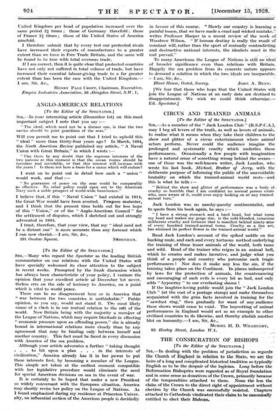[To the Editor of the SPECTATOR.] Sta,—Many who regard the
Spectator as the leading British commentator on our relations with the United States will have specially welcomed its close attention to the subject in recent weeks. Prompted by the frank discussion which has always been characteristic of your policy, I venture the opinion that your excellent article a December '1st never. theless errs on the side of leniency to America, on a point which is vital to world peace.
There can be no disagreement here or in America that " war between the two countries is unthinkable." Public opinion, as you say, would not stand it. The most likely cause of a clash is in our mutual relation to the mat of the world. Now Britain being with the majority a member of the League of Nations, which may require blockade in effecting " economic pressure upon an offending power," she is already bound in international relations more closely than by any agreement that may be binding only between herself and another country. This fact must be faced in every discussion with America of the sea problem.
Although your article advocates a further " taking thought . . . to hit upon a plan . . . in the interests of civilization," America already has it in her power to put these interests first, by becoming a member of the League. This simple act taken at the earliest moment compatible with her legislative procedure would eliminate the need for special American decisions on sea in the event of war.
It is certainly to be hoped that under a new President so widely conversant with the European situation, America may shortly revise her policy on the League of Nations. As I found emphasized during my residence at Princeton Univer- sity, an influential section of the American people is decidedly in favour of this course. " Slowly our country ..is learning a painful lesson,_that we have made a cruel and wicked mistake," writes Professor Harper in a recent review of the work of Woodrow Wilson. " If human destiny is really the result of constant will, rather than the sport of mutually contradicting and destructive national interests, the idealists must in the end prevail."
To many Americans the League of Nations is still an ideal of broader significance even than relations with Britain.
Happily the sea problem from its concrete nature appears to demand a solution in which the two ideals are inseparable.
—I am, Sir, &c., • [We fear that those who hope that the United States will join the League of Nations at an early date are destined to disappointment. We wish we could think otherwise.— Ed. Spectator.]








































 Previous page
Previous page